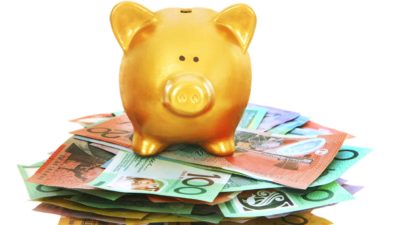I don't know about you, but I sleep with my smartphone beside my bed.
It's my alarm clock.
It's also the first thing I look at when I wake up in the morning.
This morning, that wasn't a pleasant task.
Well, actually, it wasn't that bad, but I knew today was going to be a doozy, even by recent standards.
Regardless of your politics, Australians have become used to waking up to see what the Tweeter In Chief has been up to overnight, usually related to trade policy.
And if you get excited by such things, last night didn't disappoint.
The Dow Jones Industrial Average fell out of bed. So did the S&P 500. The NASDAQ fell furthest, down 3.6% at the close of US trading.
When those things happen, you know the ASX is in for a rough day ahead.
Early trade confirmed that. The All Ords fell 2.9% at one point. Growth stocks were down, some meaningfully. Even the stalwarts weren't spared the knee-jerk selling.
Which is terrible, right?
Not so fast, Fool!
Don't get me wrong. I don't like seeing my portfolio in the red. I really dislike feeling poorer today than I was yesterday.
(And if you do enjoy that feeling, let me know and I'll send you my bank account details to help you enjoy feeling even poorer… I'm thoughtful like that.)
But there's a not-inconsequential part of my brain — the bit that's been investing for more than 20 years — that likes shares being cheaper.
You see, I intend to be a net buyer of stocks for another couple of decades or so. And if Mr Market wants to hand me a bargain from time to time, well, it'd be rude not to take him up on the offer, right?
And what if I was already retired, and not planning to add a single red cent to the market?
I'd still be okay.
See, I might, hopefully, still be reinvesting at least some of my dividends, and lower prices mean I get to buy more shares with my cash.
But even if I wasn't, I've been doing this long enough to know that these sorts of days happen every so often (and more often than you might think).
Amazon, now worth something like $1,750 per share, fell from $100 to $9 at one point. It probably felt awful, but the memory is likely salved by the subsequent performance. (I own shares, by the way)
Facebook fell, post IPO, halving between May and August 2012. The shares are now up almost 10-fold from that low.
Not to be outdone, here at home, Woolies shares fell from around $5.70 to about $4.85 in 1999 — they're currently $35, give or take a few cents.
There are simply too many examples to mention.
The banks during the GFC.
Flight Centre.
BHP when the iron ore price hit rock bottom.
Did it feel terrible? You betcha.
Was it worth selling? Like hell it was!
Tech stocks got hit hard this morning. The true believers, happy to pay up just yesterday, suddenly figured the shares were worth a lot less this morning.
Really?
The future potential — measured in decades — is that much less, just because of a couple of geopolitical announcements?
Was Apple's future value really hurt by the GFC? Nope.
Was Woolies really likely to sell fewer cans of baked beans because global financial markets seized up?
Was Facebook likely to crash and burn because a few people started a #DeleteFacebook social campaign?
Frankly, the companies least likely to be impacted by this week's events are the disrupters and innovators. The businesses that aren't relying on economic growth, but instead on convincing people that their 'better mousetrap' is indeed worth switching to.
Amazon didn't struggle during the GFC because it was too busy taking share from WalMart.
iPhones sold like hotcakes because people were prepared to forgo other expenses to get their hands on the latest and greatest.
Companies like Corporate Travel Management (I own shares of CTM, too) kept winning new customers because they had a better offering.
Now, most of those companies didn't miss a beat, even in the worst of the conditions. But some did. Flight Centre struggled during the SARS outbreak, because tourists and business travellers deferred or cancelled flights.
But you had to be a deeply pessimistic person to believe that any such impacts were permanent.
And it's been the same for not only decades, but generations.
Recessions. Oil shocks. Stagflation. Wars and confrontations. Economic upheavals and geopolitical divorces and reformations.
The world's stock markets wobbled, sometimes paused, then continued their upward march.
Different this time? That's what they said in 1915, 1939, 1945, 1969, 1978, 1987, 1999, 2008…
Is 2019 going to be the time when it really is different? After all of those times when our forebears were convinced it was, only to be proven wrong?
You'd be a brave person to bet against history.
Does that mean shares won't fall? That we won't have a recession? That geopolitical risks aren't heightened or can't get worse?
Of course not. All of those things — and more — can come to pass.
But if the world's bourses have grown despite all of that in the past, do you really reckon you can predict when such a thing will start? How long it will last? How bad it will get? How quickly it will recover?
If you answered 'no', congratulations. If you answered 'yes', get ready for a big shock (or to be probably the first person in history to do so).
Oh, and if you think you can, I trust you sold your entire portfolio on August 29 last year, bought it all back on December 21, and sold again on July 30.
You didn't? I didn't think so… and you're unlikely to get it right next time, either.
By the way, if you simply sat tight and let time do its thing, the market is up 6%, plus dividends of around 4.5%, over the last 12 months. Not bad, huh?
I'm the last bloke who's going to give you a hard time for feeling worried. For feeling the pain of loss. For wondering what the hell is going on, and what's coming next.
Those are all very reasonable and valid human emotions.
That's where I come in.
To remind you of what's happened in the past. Of the overwhelming weight of history.
And that those companies who are reinventing their markets are likely to just keep on doing precisely that.
Long after memories of August 6 ,2019, have faded, the next Apples, Amazons, Facebooks and Woolworths' of the world will be doing what they do best.
Don't miss out on the long term opportunity because of the short term volatility.
You might just kick yourself if you do.
Fool on!








